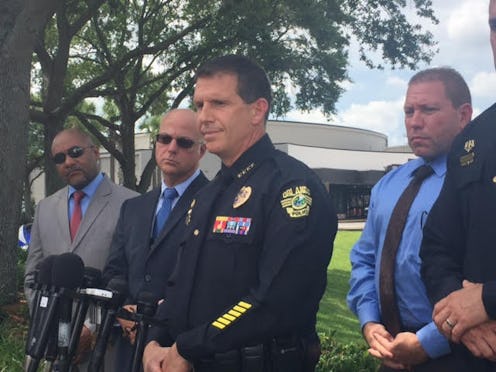News
Terrorism & Gun Violence Can't Be Separated Easily
Update: In a press conference Monday morning, Orlando police confirmed that 49 people had been killed and 53 injured early Sunday morning at Orlando's Pulse gay nightclub in the deadliest mass shooting in recent U.S. history. After opening fire on the crowd, an individual named Omar Mateen had taken hostages and was ultimately killed in a stand-off with police; Mateen had called 911 and pledged allegiance to the Islamic State shortly before the massacre. Orlando mayor Buddy Dyer declared a state of emergency, and the massacre is being investigated as an act of terrorism.
The victims' names were released by the city of Orlando on its website as their next of kin were informed. Here are some ways to help the Orlando shooting victims and their loved ones; you can also donate to the victims' fund, as well as express your solidarity with the LGBTQ community by posting a tribute online. You can also attend a vigil near you to honor the victims.
Earlier: On Sunday, Pulse, a gay nightclub in Orlando, was the target of the worst mass shooting in U.S. history. At least 50 people were killed in the horrific attack and 53 were injured, which ended in a stand-off between the gunman and police. Law enforcement officials have labeled the shooting an act of terrorism, as the New York Times reported. The New York Times also noted that FBI agent Ronald Hopper "raised the possibility that the killer was an Islamist radical." Nothing has been confirmed at the time of writing and Hopper stressed at a press conference that "right now we can’t say definitively, so we’re still running everything around.” In the wake of the Orlando shooting, many are quick to debate whether the tragedy reflects problem with terrorism or gun laws, but FiveThirtyEight's analysis shows the two concerns may not be so separate.
Carl Bialik at FiveThirtyEight noted that, "Since the Sept. 11 attacks, the number of people killed by guns in terror attacks in the U.S. has risen, as has the number of terror attacks involving guns." Specifically, between 2002 and 2014, 85 percent of all people in the U.S. killed in acts of terrorism were killed by guns, according to FiveThirtyEight.
Bialik offered some information that may relate to the apparent correlation. Jeffrey Simon, a visiting professor at the University of California Los Angeles, told FiveThirtyEight that guns are easier for terrorists to access “and are less likely to result in a terrorist operation being compromised.” Simon added, "That’s particularly appealing to lone wolves. We’ll see more of that in the U.S.” Bialik also noted that Arie Perliger, the director of terrorism studies at the U.S. Military Academy, believes "that U.S. terrorists are turning to guns because since Sept. 11, the federal government has monitored the use of explosives and the trade of materials that can be turned into explosives."
Whether the tragedy in Orlando changes the United States' approach to gun laws or terrorism remains to be seen, but FiveThirtyEight provides some key evidence that they may not be distinctly separate areas for legislators to tackle.
